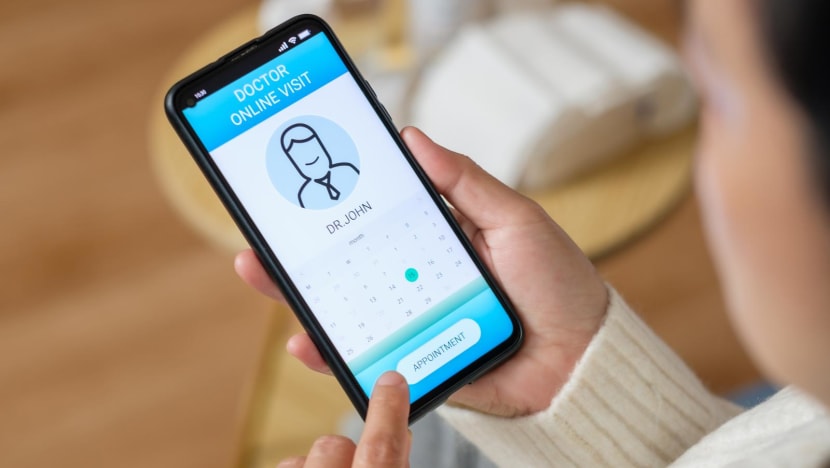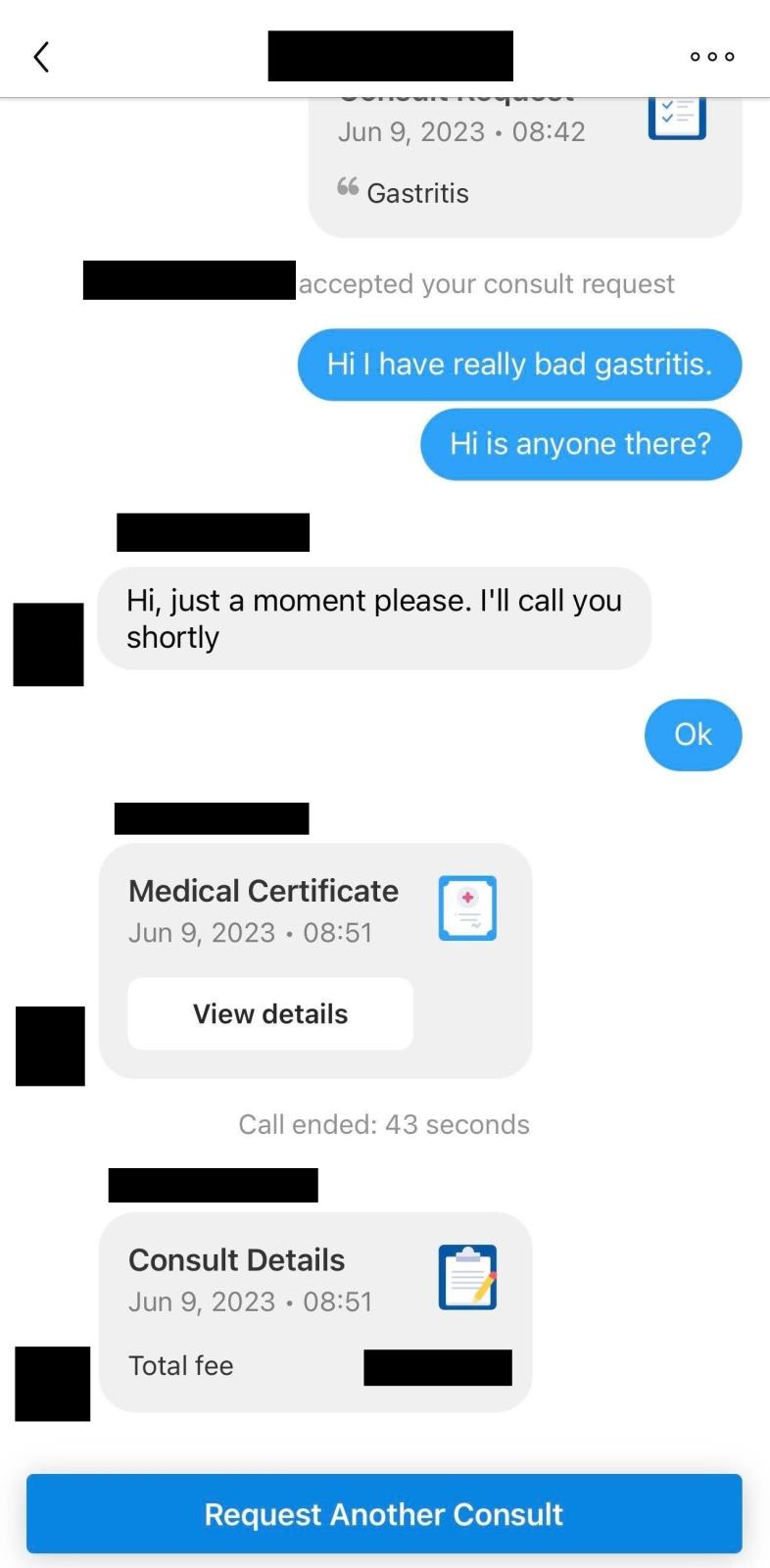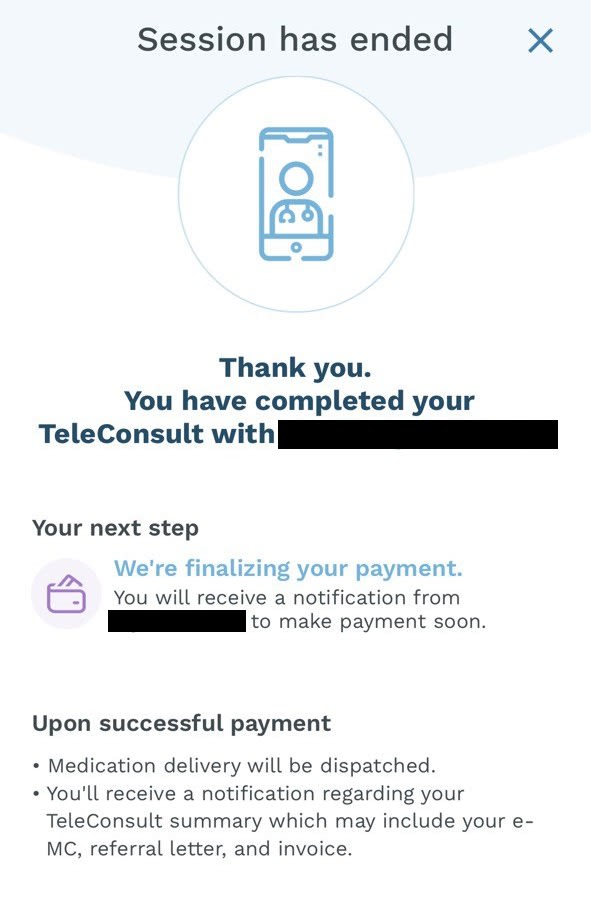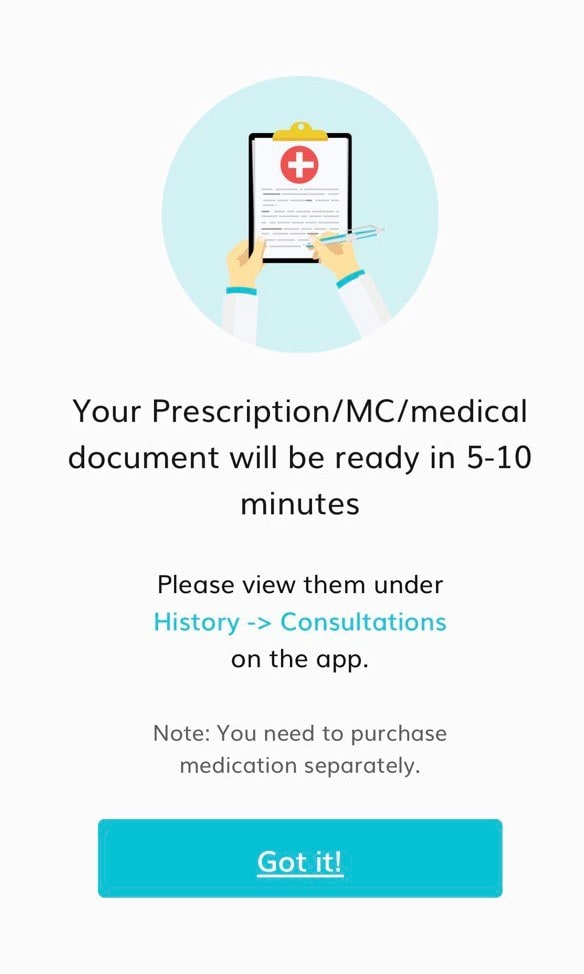Can you get an MC in under 1 minute? CNA tests telemedicine apps to find out
Even if they suspect a patient is faking an illness, doctors and telemedicine providers say they often give them “the benefit of the doubt”.

A patient booking an appointment for an online visit with a doctor. (File photo: iStock)
SINGAPORE: How long does it take to get a medical certificate (MC) from a virtual doctor? Probably a few minutes and possibly as quick as 43 seconds, as CNA found out.
CNA tested three telemedicine apps, where patients can have video consultations with doctors.
All three apps – MaNaDr, MyHealth360 and Doctor Anywhere – asked for patient information prior to seeing a doctor. This includes information on whether a patient has any pre-existing conditions and drug allergies, and their reason for seeing a doctor. Patients can also upload photos of their medical condition, such as rashes, to aid their diagnosis.
MaNaDr is operated by a company called Mobile Health, and works with more than 30 doctors, according to its website. Its website also lists "Medical Certificate" as one of its services and states: "Get your medical certificate in a blink of an eye". But it specifies that MCs are only given out after consultation with a doctor.
Once we started the video consultation, the doctor asked what was wrong and if medical examinations had been conducted on the condition (we had specified "gastritis").
He asked how many days of sick leave was required, to which we replied one day. The call then ended and an MC as well as the payment details were sent by email.
The consultation was over in 43 seconds.

CNA also tested MyHealth360, an app operated by Singapore's largest private hospital chain IHH Healthcare.
The "ailment" this time was a cough. During the video consultation, which lasted for two minutes, the doctor asked if we had symptoms such as a runny nose, sore throat and fever, and whether there was a history of asthma.
The doctor then asked if an MC or medicines were needed, to which we asked for a day of sick leave. The session ended and an electronic MC and bill were sent.
The Doctor Anywhere consultation went similarly – the doctor asked about symptoms and he recommended medication for the ailment indicated (it was a blocked nose in this case).
Towards the end of the session, the doctor asked if we needed an MC.
Just as with the other apps, we asked for one day of sick leave and the call ended within two minutes.


CONSULTATION TIME DEPENDS ON PATIENT PROFILE AND CONDITION: DOCTORS
Responding to CNA's queries, Doctor Anywhere said the duration of its consultations depends on various factors, including patient profile, medical condition and physician expertise.
"Simple ailments such as flu symptoms may require less time, while patients with more complex or multiple health concerns will necessitate a longer consultation," a spokesperson said.
Consultation time is longer for the elderly, children and those with pre-existing medical conditions.
MCs are issued only after proper clinical assessment, the spokesperson said, adding that the assessment is "heavily reliant" on symptoms reported by the patients.
To prevent abuse, patients who call in frequently will be advised to have a physical consultation instead. Doctors' practices, including the issuing of MCs, are also monitored.
MaNaDr’s founder and CEO Siaw Tung Yeng said the length of teleconsultations is “not a one size for all”.
Consultations can range from a few minutes to half an hour for longer cases. The duration of the session depends on doctors and the type of symptoms they are dealing with, said Dr Siaw.
As MaNaDr’s consultations include both video and text, there are exchanges with the patients and doctors have a “good grasp” of the problems before the virtual sessions, he said.
“The advantage (of online consultation) is that we can glean a lot of information from one particular case and it doesn’t need a long video consultation because all the information is there,” Dr Siaw added.
“To an experienced doctor, (information) can be gleaned in less than 30 seconds to one minute to decide the severity of this illness, whether you need to go to an A&E or whether you can be treated at home.”
MCs are “always a professional decision” and it is “never a matter of how fast or how slow”.
“It's a matter of how much information the doctor has already got from the patient and how much experience a doctor has with dealing with this condition. Speed is never the benchmark here,” Dr Siaw added.
CNA has also contacted the operator of the MyHealth360 app for their response.
CLINICAL DECISIONS MUST BE "JUSTIFIABLE AND DEFENSIBLE"
In a 2018 memo to doctors about telemedicine and the issuance of online MCs, the College of Family Physicians Singapore and Singapore Medical Association said doctors will be held accountable if clinical standards are met.
At the time, they said telemedicine technology was unable to replace face-to-face consultation. Doctors who conduct such virtual consultations should be aware that their clinical decisions must always be “justifiable and defensible”.
An MC should only be issued after careful and adequate assessment and is “a responsibility that cannot be taken lightly”, the memo said.
Both organisations did not respond to CNA’s request for comment.
The Ministry of Health (MOH) said questions on online MCs arose “only because of abuse by a minority”.
Telemedicine is a "more convenient" option for employees who fall sick and need MCs to cover their absence from work, the ministry said in response to CNA’s queries.
Doctors are required to abide by the Singapore Medical Council’s (SMC) guidelines, which state that MCs should be issued only on proper medical grounds. This is also reinforced during doctors' training.
Doctors who breach these guidelines can be referred to the council, added MOH.
The guidelines also state that the same quality and standard of care must be provided to patients through telemedicine as in-person medical care. This includes ensuring doctors have sufficient training and information to manage patients through telemedicine.
The licensing of telemedicine providers under the Healthcare Services Act came into effect on Jun 26 this year.
Licensees are required to seek MOH's approval for the modes of service they are delivering, including virtual medical consultations. This is a change from previous regulations where healthcare providers were licensed based only on their physical premises.
Telemedicine providers must also comply with requirements such as undergoing MOH training and using “live” video for consultations with first-time patients, said the ministry.
GIVING PATIENTS THE BENEFIT OF THE DOUBT
Other clinics and telemedicine providers CNA spoke to said doctors have to assess patients based on trust and good faith.
Raffles Medical's Dr Ryan Thian Wan Lee said teleconsultations rely on obtaining a detailed medical history from patients and observing visual cues during video calls.
“While there are no specific protocols exclusively designed for doctors to issue medical certificates via teleconsultation, the underlying process and considerations remain consistent with those followed in a physical clinic setting,” said Dr Thian, who is a senior family physician.
A Fullerton Health spokesperson said the process of consulting a doctor online involves mutual trust – in that "a patient entrusts his condition to a doctor for proper treatment, and that doctor trusts that the patient's predicament is genuine".
When in doubt, doctors are advised to review a patient's MC record, and if there are concerns of malingering – deliberately feigning symptoms – doctors will refer a patient for an in-person assessment.
Dr Wong Jiayi, the assistant medical director at Minmed Group, said most symptoms reported during a typical consultation would not be visible. For instance, a patient with migraine may not have any physical signs of it.
“Unless there is a history of abuse, we should take the reported symptoms in good faith. This is true whether it is a teleconsult or a physical clinic visit,” he said.
Dr Mok Boon Rui, founder of Pinnacle Family Clinic, told CNA the clinic has its own system to check how many MCs have been given to a patient.
While he has not seen many “abuse cases” in his practice, Dr Mok said that if he suspects abuse, he would still give the patient a day or half a day of sick leave and ask them to visit the clinic for a physical examination.
“(Whether the patient is an) MC seeker or MC abuser, they are still humans, they can still fall sick. It is our duty to look after anyone regardless of whether they are an abuser or not,” said Dr Mok, who is a family physician.
Dr Lee Joon Loong from Paddington Medical Clinic added that a patient might have some underlying issues, such as problems at home, for malingering.
“The MC system is just a system but I'm here to address the medical problems, even the psychological issues that patients face,” said Dr Lee, who is the clinic’s medical director.
Giving an example of a patient visiting him for a headache, Dr Lee said he trusts the patient is reporting the symptoms accurately.
“Even if I don't pick up any signs of examination … apart from the symptoms reported by the patient, I still give my patients the benefit of the doubt.
“They may just need a day off … just a piece of paper that they need. But more importantly, it’s the trust between doctor and patient that is still paramount,” said Dr Lee.


















